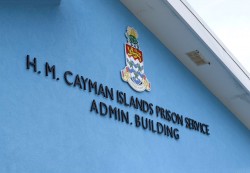News
Twin Focus on Development & Rehabilitation for HMCIPS

Her Majesty’s Cayman Islands Prison Service (HMCIPS) is set to increase the educational portfolio offered to incarcerated persons in 2019.
In the months ahead the HMCIPS will build on its already wide catalogue of existing courses offered through the rehabilitation unit, with new programmes that expand its focus on vocational training and preparation for re-entry.
HMCIPS Director Steven Barrett says the prison will introduce a number of new workshops including plumbing, electrical training, auto mechanic repairs and appliance repairs.
“We are keen to ensure that these work opportunities are integrated with our education portfolio. It is less about the nature of the work, although that is important, but it is more about the competencies that will be developed for those who participate in these programmes; competencies that will be industry transferrable,” Mr. Barrett comments.
Training will be provided by prison officers who are trained and certified to deliver these vocational courses, in conjunction with the University College of the Cayman Islands using City & Guilds and the Institute of the Motor Industry curriculum and certification.
The full suite of programmes is scheduled to commence in June 2019 and run on a six-month cyclical basis. Inmates will complete all of the core competencies such as basic math and English for the workplace, employability skills training, life skills, interpersonal skills, emotional intelligence as well as the programmes which they are assessed to need as per the psychological assessments.
Current vocational programmes already underway include the woodwork shop, the agricultural project and the Fresh Start construction industry training programme.
The Fresh Start construction industry training programme is run in collaboration with private sector partners Phoenix, Clan Construction and Encompass. The programme is ongoing with 14 men currently enrolled.
- 2018, 16 inmates enrolled in the Fresh Start rehabilitation programme, four of whom participated in the Release on Temporary License (ROTL) programme, which allowed them to be released into the community with certain restrictions once they secured employment with one of the Fresh Start companies.
The woodwork shop project trains inmates in health and safety, hand and power tools operations and the construction of many items including picnic tables, garbage can holders, park benches, swings, etc. HMCIPS is also piloting a new course in barbering which will provide inmates with the opportunity to gain a certification in barbering.
The prison farm provides another training environment and 15 inmates are currently receiving formal instruction in agricultural science. In 2018, crops from the farm earned $16,000 from sales to supermarkets and other local vendors. Focus is also placed on the cultivation of creative talents, and over the course of the last year male and female inmates submitted 150 pieces of art and craft work to three different shows.
Deputy Director of Rehabilitation, Ms. Aduke Joseph-Caesar, says the overall goal of vocational training is to reduce inmates’ risk of recidivating by teaching them marketable skills they can use to find and retain employment following release from prison.
“This type of hands-on training can make a huge impact as it enables inmates to participate in apprenticeship programmes and connect with prospective employers, giving them access to jobs that provide reasonable salaries that help to stabilise their lives after release,” she explains. “In addition, some vocational training programmes include opportunities to put in man hours which count towards industry-recognised credentials and certificates.”
The vocational training augments more traditional academic courses. Last year more than 100 inmates completed online courses, 5 passed the Caribbean Examinations Certificate Exam, 3 completed tertiary education degrees in areas ranging from theology to continuing education, while three enrolled in higher learning. An additional 25 inmates completed university and college level certificates.
To facilitate the planned growth in training opportunities for inmates the Prison Service is looking to expand on the number of community partnerships in which it engages Home Affairs Minister Hon. Tara Rivers explains.
“The more public and private sector partnerships can be developed, the greater the ability to assist inmates with the transition from prison back into the community as fully contributing citizens. The Government is extremely grateful to those who have partnered with the Prison Service, and we look forward to expanding this network so that together we can reduce reoffending and the strain that it places on the criminal justice system, families and the community,” Minister Rivers concluded.
Public and private organisations interested in partnering with HMCIPS to support expanded training and work experience opportunities for inmates should contact the Prison Director Mr. Steven Barrett at steven.barrett@gov.ky.












